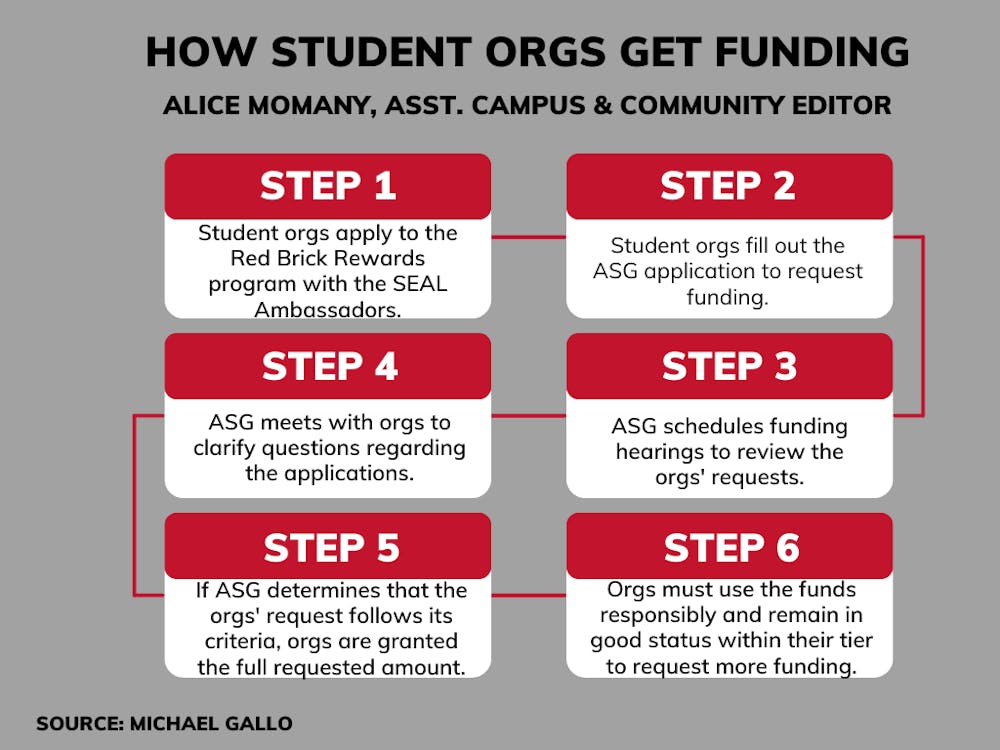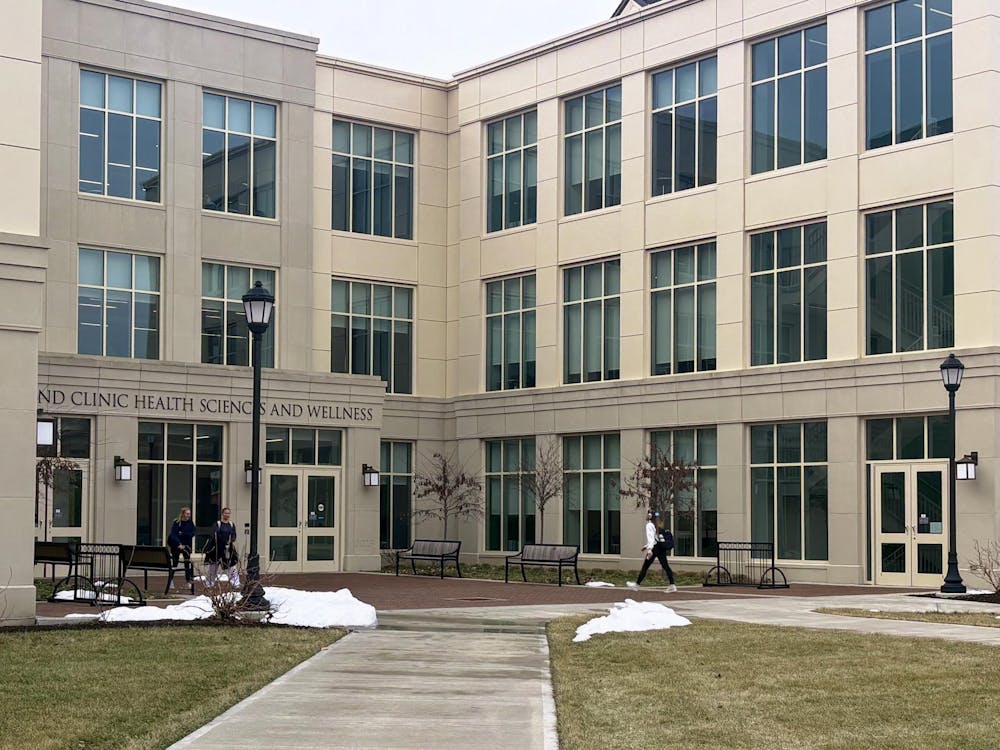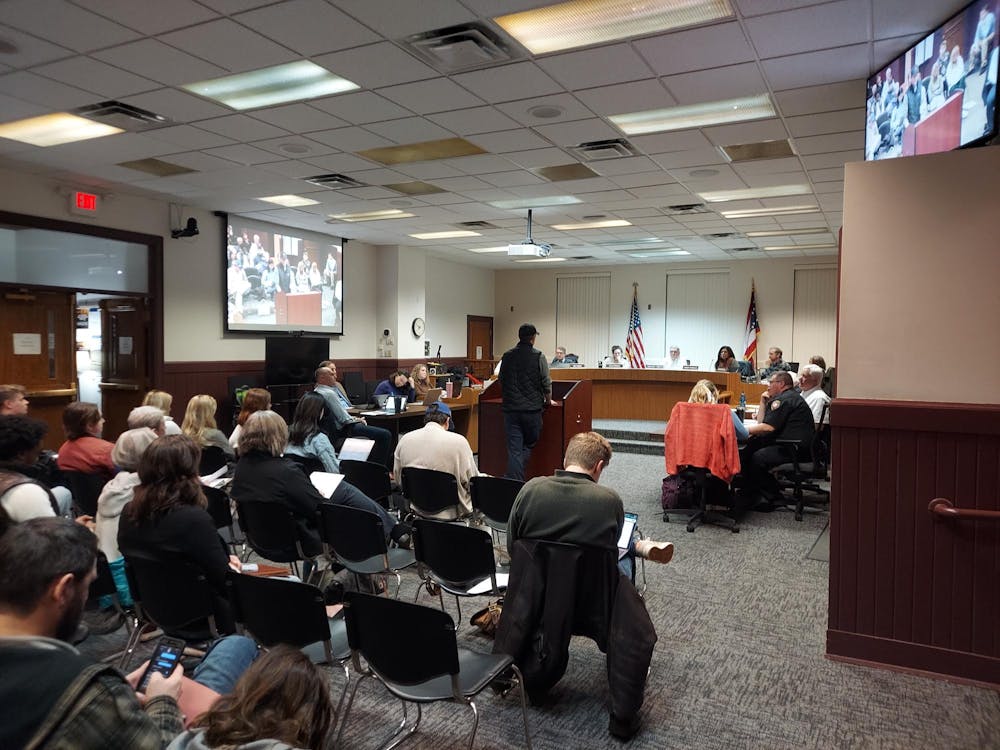At Miami University’s Associated Student Government’s (ASG) October funding hearings, the Indian Students Association asked for $600 to fund their organization. ASG gave the club $1,700.
Students for Life requested $8,000. They received $10.
The American Institute of Architecture Students asked for almost $7,000. ASG gave them $0.
ASG receives the money to give to organizations from the university’s basic general fee incorporated into student tuition. Michael Gallo, secretary of finance for ASG, did not know ASG’s current operating budget but reached out to Maria DeVictor, secretary of the treasury for ASG. Gallo did not respond with the amount.
There are five opportunities throughout the school year for student organizations to apply for funding. Student organizations can request funding in each of the five cycles for items such as marketing supplies, guest speakers and food.
An organization can request funding from ASG by filling out paperwork that details how much money they need, where the money is going and quotes for everything they intend to purchase. Then, ASG hosts scheduled hearings to go over the request. Any amount under $300 is automatically approved and does not require a hearing.
“We have four different criteria,” Gallo said. “Each criteria represents 25% of funding. [We ask] is it accessible by BCRTA route? Is it open to all students? Do they have any penalties? Does it fit the purpose of the org as defined in the organization’s constitution?”
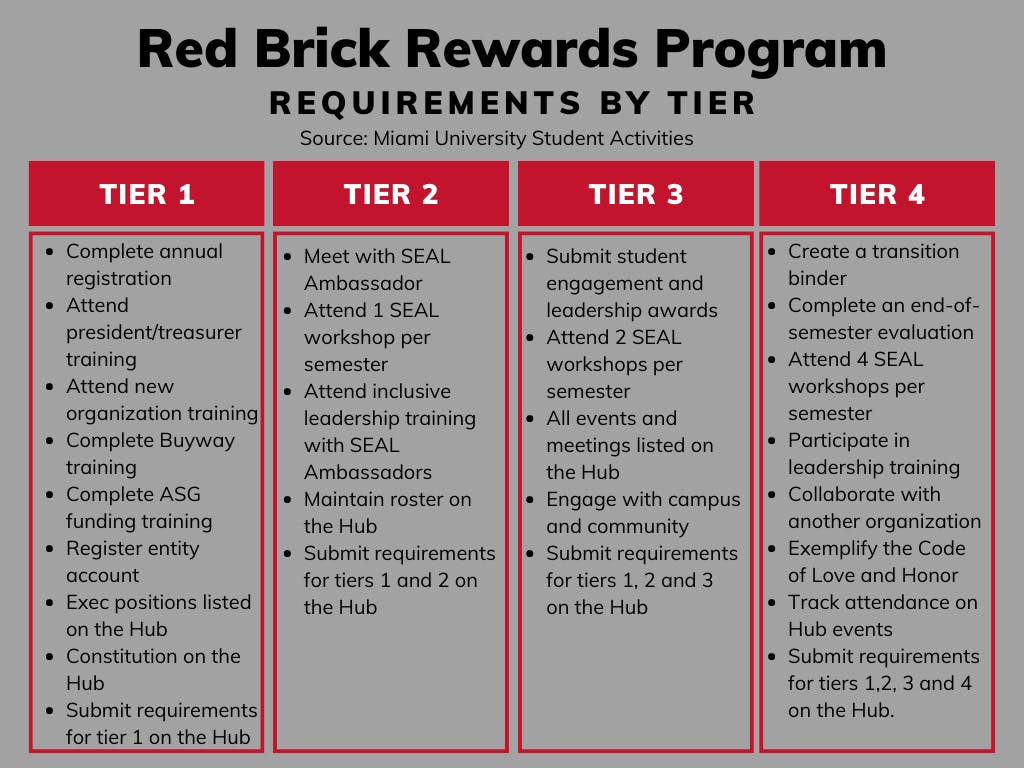
In order to receive 100% of an organization’s requested funding, an off-campus event has to be along the BCRTA bus routes. An event also has to be “open for all” which means admission cannot be charged to attend. If an organization has not demonstrated responsible spending history and has penalties imposed by ASG, they will lose 25% of their funding. Lastly, an event has to be educational while aligning with the purpose of the organization.
If an organization doesn't fulfill these criteria, there are two “make-up” categories: an event has to be a late-night event or service-based. According to ASG’s Funding Committee Standing Rules, a late night event is an on-campus event that occurs after 8 p.m. on Thursday, Friday or Saturday. A service-based event is defined “at the discretion of a majority of the funding committee.” If an organization does not meet these criteria, it will not get the amount requested.
Gallo said another reason organizations don’t get funding is because planned events must be on the Hub before the hearing.
Enjoy what you're reading?
Signup for our newsletter
“If your event is not on the Hub before the start of the funding hearing, unfortunately, that’s like the number one leading reason an org doesn’t get funding,” Gallo said.
If an organization receives more funding than ASG recorded, Gallo said it’s due to discrepancies between the amount requested.
“The student organization has to type [the amount requested] manually [on an Excel spreadsheet], and if that’s too low, that just means that the actual document they sent us has a higher number,” Gallo said.
Red Brick Rewards Program
Before a student organization can receive funding, it has to apply for the Red Brick
Rewards program through the SEAL Ambassadors. Red Brick Rewards, established in 2018, is a four-tier system that determines how much an organization can request in funding. If a student organization maintains its tier while completing other requirements, it can move up in the tier system and request more funding.
JS Bragg, the assistant director for Student Organizations at Miami, said the Red Brick Rewards program is a fair and equal way to allocate money to student organizations.
“ASG had to completely revamp funding because there were a few policies that were making it impossible to accurately allocate funding to orgs,” Bragg said.
This year, ASG allocated more money for each of the tiers. Student organizations i
n tier one are limited to $3,000. Tier two organizations are restricted to $6,000. Tier three is capped at $7,500, and student organizations in tier four status can request up to $12,500. New student organizations can request up to $1,500 and have one semester to complete the requirements for tier-one status.
“ASG is running with a budget surplus right now because we still got our full allocations during 2020 and 2021 despite student organizations not hosting the same number of events," Gallo said. "So just in the spirit of trying to use that money for what it was originally intended, we increased the caps for tiers.”
Livia Zuesi, the treasurer of Dance Theatre, a tier four organization, said the increase in funding was helpful because it allowed them to spend more on costumes and equipment.
“This semester, it’s cool because [ASG] upped funding by $2,500,” Zuesi said. “Normally, it’s $10,000, and we normally hit $10,000. This year, we were able to request a little bit more because they gave us extra money.”
Bragg said the program, now in its fourth year, has increased the number of organizations asking for funding.
“We’ve seen a lot more organizations asking for funding," Bragg said. "We’ve seen a lot more collaboration, and we’ve seen a lot more specific funding."
Some organizations find the funding process simple, others disagree
Jack Ernstberger, treasurer of Miami’s Guitar Club, requested money on behalf of the organization for the first two cycles of funding hearings in September and October.
For the first cycle, the tier four club received 100% of the funds they requested, which was more than $9,000. After the second cycle, the club received 96%, which was more than $2,000. Ernstberger said he doesn’t remember why they didn’t receive the full amount, but that it didn’t impact the club too much.
“We did both cycles, and they went pretty well for us,” Ernstberger said.
With the $11,000 they received, Ernstberger said the club bought food, guitars, amps and other equipment. Since this is Ernstberger's first term as treasurer, it was the first time he participated in an ASG hearing, but he said the process was simple to understand.
Dance Theatre also submitted requests during both funding cycles and received 98% of its funds the first time and 100% the second time. During the first cycle, there was a discrepancy in a dance instructor coming to visit, but it was fixed during the second cycle. Zuesi said the process was confusing at first but easier to understand during the second cycle.
“I think I was overwhelmed a little bit at the start mainly because I w
as just learning the new role, but once I got the hang of it, the document is pretty self-explanatory,” Zuesi said.
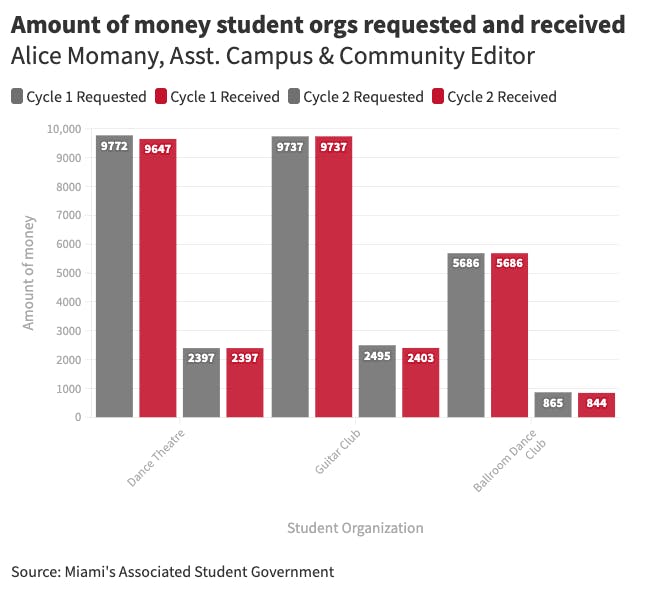
Maggie Fryman, president of the Ballroom Dance Club, also found the process confusing when she went through it the first time.
“When I went through the training, it made a lot of sense, but I never applied it until I had to, and after I applied it, then I came up with more questions,” Fryman said.
Ballroom Dance Club, a tier three organization, completed both funding cycles this semester. It earned 100% of its request the first time and 97% the second time. Fryman said the second time was due to a discrepancy in booking a place to stay for an overnight trip.
Fryman suggested clearer guidelines and more interactive resources for first-time organizations.
“There’s lots of SEAL workshops that we have to attend,” Fryman said. “It would be interesting to have an ASG-specific SEAL workshop … potentially a workshop specifically for treasurers or even an online workshop of what a funding hearing looks like and what problems have come in hearings and how orgs can prevent those problems from happening.”
To ensure that organizations get the amount they request, Gallo encourages any new or existing organization to reach out with questions.
“We’re always available. We’re here to help student orgs,” Gallo said. “If you want to set up a meeting, we can set up a meeting to talk about it. If you want us to look over your funding doc, we can look over your funding doc. We’re here to help.”

